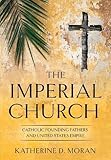The Imperial Church : Catholic Founding Fathers and United States Empire / Katherine D. Moran.
Material type: TextSeries: The United States in the WorldPublisher: Ithaca, NY : Cornell University Press, [2020]Copyright date: ©2021Description: 1 online resource (330 p.) : 11 b&w halftonesContent type:
TextSeries: The United States in the WorldPublisher: Ithaca, NY : Cornell University Press, [2020]Copyright date: ©2021Description: 1 online resource (330 p.) : 11 b&w halftonesContent type: - 9781501748820
- 9781501748837
- 325.320973 23
- BX1406.3 .M67 2021
- online - DeGruyter
| Item type | Current library | Call number | URL | Status | Notes | Barcode | |
|---|---|---|---|---|---|---|---|
 eBook
eBook
|
Biblioteca "Angelicum" Pont. Univ. S.Tommaso d'Aquino Nuvola online | online - DeGruyter (Browse shelf(Opens below)) | Online access | Not for loan (Accesso limitato) | Accesso per gli utenti autorizzati / Access for authorized users | (dgr)9781501748837 |
Browsing Biblioteca "Angelicum" Pont. Univ. S.Tommaso d'Aquino shelves, Shelving location: Nuvola online Close shelf browser (Hides shelf browser)

|

|

|

|

|

|

|
||
| online - DeGruyter To Be an Entrepreneur : Social Enterprise and Disruptive Development in Bangladesh / | online - DeGruyter The Picky Eagle : How Democracy and Xenophobia Limited U.S. Territorial Expansion / | online - DeGruyter The Man in the Dog Park : Coming Up Close to Homelessness / | online - DeGruyter The Imperial Church : Catholic Founding Fathers and United States Empire / | online - DeGruyter Mobilizing for Development : The Modernization of Rural East Asia / | online - DeGruyter Despotism on Demand : How Power Operates in the Flexible Workplace / | online - DeGruyter To Bring the Good News to All Nations : Evangelical Influence on Human Rights and U.S. Foreign Relations / |
Frontmatter -- Contents -- Acknowledgments -- A Note on Terminology -- Introduction: Thinking with Catholicism, Empire, and History -- PART I. Jacques Marquette in the Upper Midwest -- 1. Making a Founding Father out of a French Jesuit -- 2. Imagining Peaceful Conquest -- PART II. Franciscans in Southern California -- 3. Making Parallel Histories out of Spanish Missions -- 4. Embodying Hospitality and Paternalism -- PART III. Friars in the Philippines -- 5. Revising and Rejecting Antifriarism -- 6. Envisioning Catholic Colonial Order -- Conclusion: Imperial Church Stories -- Notes -- Bibliography -- Index
restricted access online access with authorization star
http://purl.org/coar/access_right/c_16ec
Through a fascinating discussion of religion's role in the rhetoric of American civilizing empire, The Imperial Church undertakes an exploration of how Catholic mission histories served as a useful reference for Americans narrating US settler colonialism on the North American continent and seeking to extend military, political, and cultural power around the world. Katherine D. Moran traces historical celebrations of Catholic missionary histories in the upper Midwest, Southern California, and the US colonial Philippines to demonstrate the improbable centrality of the Catholic missions to ostensibly Protestant imperial endeavors.Moran shows that, as the United States built its continental and global dominion and an empire of production and commerce in the Gilded Age and Progressive Era, Protestant and Catholic Americans began to celebrate Catholic imperial pasts. She demonstrates that American Protestants joined their Catholic compatriots in speaking with admiration about historical Catholic missionaries: the Jesuit Jacques Marquette in the Midwest, the Franciscan Junípero Serra in Southern California, and the Spanish friars in the Philippines. Comparing them favorably to the Puritans, Pilgrims, and the American Revolutionary generation, commemorators drew these missionaries into a cross-confessional pantheon of US national and imperial founding fathers. In the process, they cast Catholic missionaries as gentle and effective agents of conquest, uplift, and economic growth, arguing that they could serve as both origins and models for an American civilizing empire.The Imperial Church connects Catholic history and the history of US empire by demonstrating that the religious dimensions of American imperial rhetoric have been as cross-confessional as the imperial nation itself.
Mode of access: Internet via World Wide Web.
In English.
Description based on online resource; title from PDF title page (publisher's Web site, viewed 01. Dez 2022)


